When Missionary Families Witness or Experience Traumatic Events
Sahana Kanabar and Tanya Crossman
TCK Training’s 2021 survey on childhood trauma in globally mobile Third Culture Kids collected data from 1,904 Adult Third Culture Kids who experienced global mobility. While the initial data analysis focused on Adverse Childhood Experiences (published in our white papers Caution and Hope and TCKs at Risk) our latest white paper Sources of Trauma in International Childhoods: Providing Individualized Support to Increase Positive Outcomes for Higher Risk Families looks at potentially traumatic experiences occurring in the community. This article is part of a series of blog posts that looks a little deeper at certain sub-groups represented in the data.
When Missionary Families Witness or Experience Traumatic Events
Part of TCK Training’s research on the well-being of Third Culture Kids (TCKs) looked at potential sources of trauma which might impact children. Missionary Kids (MKs) made up more than half of the respondents in our 2021 survey, with 1,068 MKs sharing their experiences. We learned some harsh realities through this research, such as that 1 in 3 MKs were impacted by war, and half were impacted by a family medical crisis. Exposure to various types of potentially traumatic events were also associated with higher ACE scores.
In this blog post, we go through data from our white paper “Sources of Trauma in International Childhoods: Providing Individualized Support to Increase Positive Outcomes for Higher Risk Families” that applies specifically to missionary kids. We hope to see this research used to support the well-being of missionary kids globally – before, during, and after their time abroad.
In this blog post, we go through data from our white paper “Sources of Trauma in International Childhoods: Providing Individualized Support to Increase Positive Outcomes for Higher Risk Families” that applies specifically to missionary kids. We hope to see this research used to support the well-being of missionary kids globally – before, during, and after their time abroad.
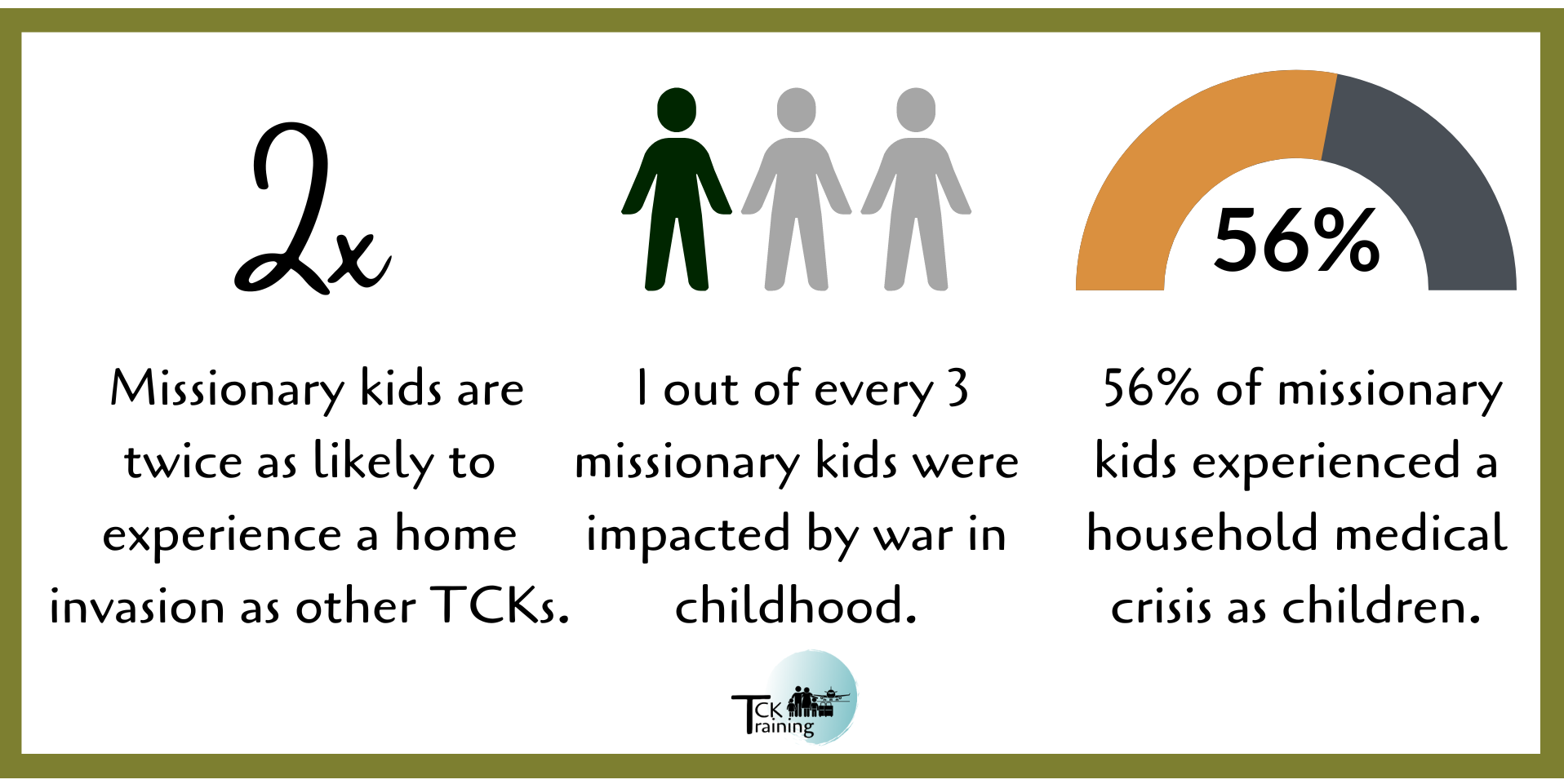
What is a traumatic event?
‘Trauma’ describes an event that produces harm for an individual with lasting effects. ‘Big T’ trauma describes life-threatening situations including violence and disaster. ‘Little t’ trauma does not necessarily involve physical harm, but describes situations that create mental and emotional distress. All types of trauma can negatively impact mental and physical health throughout life, increase risk-taking behaviors and suicidal ideation, and harm relationships. Traumatic childhood experiences that go unrecognized and unprocessed can cause these problems later in life.
In this blog post, we discuss three categories of potentially traumatic events. These are events likely to cause either a ‘Big T’ or ‘little t’ trauma impact on the individual. In the “Sources of Trauma” white paper we discuss a research framework behind why such events can be traumatic, and how they can impact young people long term.
In this blog post, we discuss three categories of potentially traumatic events. These are events likely to cause either a ‘Big T’ or ‘little t’ trauma impact on the individual. In the “Sources of Trauma” white paper we discuss a research framework behind why such events can be traumatic, and how they can impact young people long term.
- Small-scale events: localized to the household or local community
- Large-scale events: affect a wide area or large community as well as having personal impact
- Witnessed events: when an individual sees something without necessarily being personally involved
Small Scale Events
Medical Events
Multiple studies have connected serious medical issues, including chronic illness, with negative impacts on the patient’s family. Importantly, these stressors can impact the family’s long term emotional health. We asked about three categories of medical trauma: (1) medical crisis; (2) prolonged illness; and (3) death.
Missionary Kids (MKs) experienced every type of household medical event at higher rates than Non-Missionary TCKs. Over two thirds of MKs (67%) experienced a household medical event during their childhood compared to just under half of all other TCKs (48%).
Medical crises affected over half of MK households (56%), and prolonged illness over one third (34%). When MKs reported a medical crisis, they were 1.3 times more likely to have an ACE score of 4+. The reality is that medical trauma not only impacts the individual but the family as a whole. Over half of MKs who reported prolonged illness in their household also reported experiencing emotional abuse, emotional neglect, and household adult mental illness.
Almost 1 in 10 MKs (8%) reported that a member of their household died while they were a child. More than half of MKs who reported household death also reported emotional abuse and emotional neglect. More than a third reported childhood sexual abuse. 6% of MKs reported the death of a non-residential caregiver; these MKs were more likely to have a high-risk ACE score than those who reported a household death (31% vs 24%).
Multiple studies have connected serious medical issues, including chronic illness, with negative impacts on the patient’s family. Importantly, these stressors can impact the family’s long term emotional health. We asked about three categories of medical trauma: (1) medical crisis; (2) prolonged illness; and (3) death.
Missionary Kids (MKs) experienced every type of household medical event at higher rates than Non-Missionary TCKs. Over two thirds of MKs (67%) experienced a household medical event during their childhood compared to just under half of all other TCKs (48%).
Medical crises affected over half of MK households (56%), and prolonged illness over one third (34%). When MKs reported a medical crisis, they were 1.3 times more likely to have an ACE score of 4+. The reality is that medical trauma not only impacts the individual but the family as a whole. Over half of MKs who reported prolonged illness in their household also reported experiencing emotional abuse, emotional neglect, and household adult mental illness.
Almost 1 in 10 MKs (8%) reported that a member of their household died while they were a child. More than half of MKs who reported household death also reported emotional abuse and emotional neglect. More than a third reported childhood sexual abuse. 6% of MKs reported the death of a non-residential caregiver; these MKs were more likely to have a high-risk ACE score than those who reported a household death (31% vs 24%).
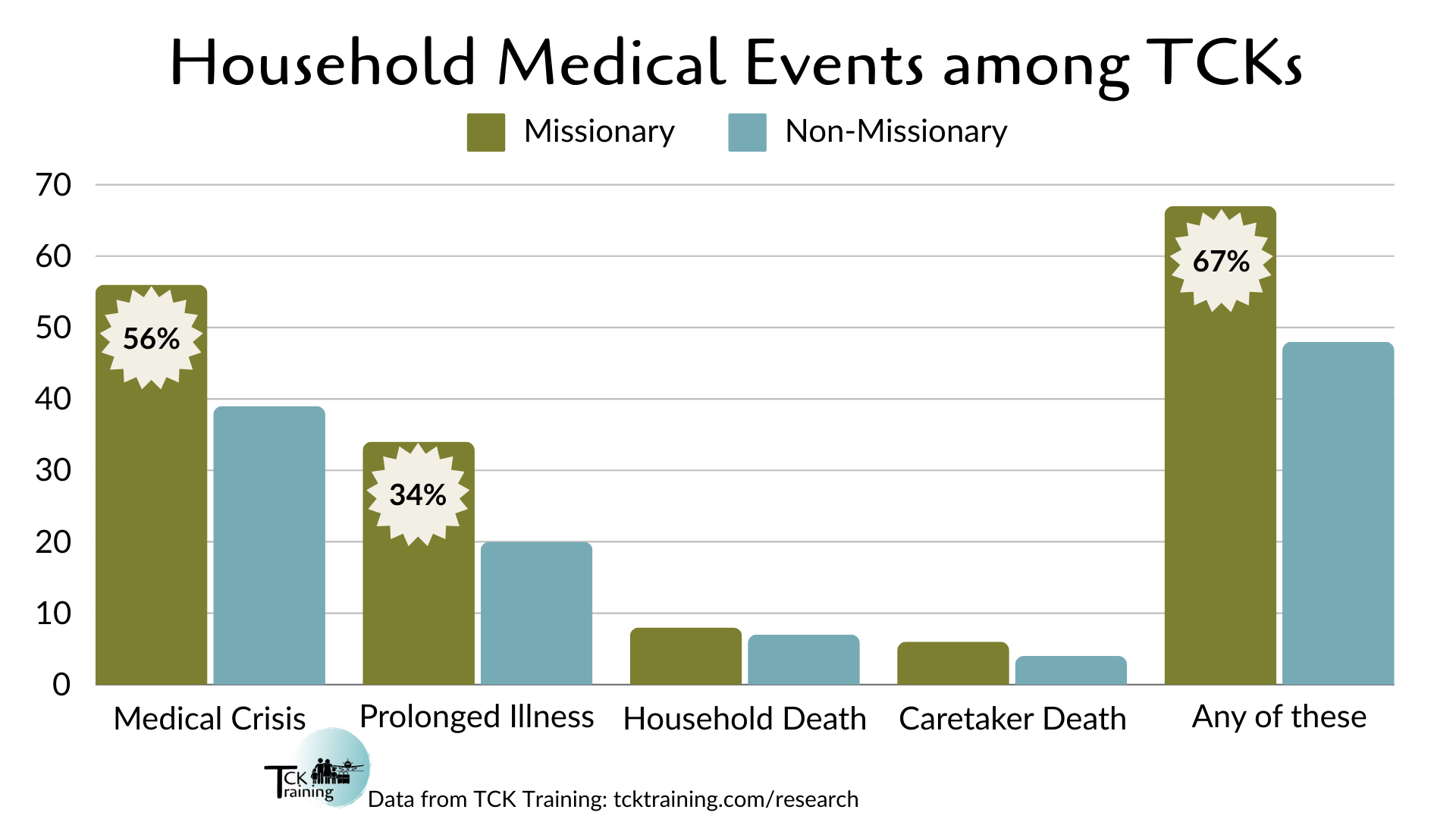
Violent Events
When violence is part of a family’s lived experience, it affects each family member. Our research illustrates the increase in Adverse Childhood Experiences like physical abuse, emotional abuse, emotional neglect, and mental illness of parents in the home.
When violence is part of a family’s lived experience, it affects each family member. Our research illustrates the increase in Adverse Childhood Experiences like physical abuse, emotional abuse, emotional neglect, and mental illness of parents in the home.
When home doesn’t feel like a safe place, children/young people stay ‘on alert’ without feeling safe to fully relax anywhere in their world. This leads to a state called ‘toxic stress’ which has negative impacts on the brain and body.
Violence can occur in many forms, and exposure to violence at a young age is known to impact development. (More information on this research can be found in the Sources of Trauma white paper). The types of violence asked about included:
- a household member suffering violent harm
- a home invasion/break-in (while the person was home, or while they were away)
- a violent incident occurring at their school while they were present
- a violent incident occurring at another place while they were presenta violent incident occurring in a place they regularly went to while they were not present.
More than half of MKs (57%) surveyed reported experiencing one of these violent events in their childhood compared to 37% of non-missionary TCKs. The most common event was a home invasion, experienced by nearly 2 in 5 MKs (38%). By comparison, fewer than 1 in 5 non-missionary TCKs (17%) experienced a home invasion. 1 in 10 MKs (11%) also reported that a member of their household suffered violent harm.
The survey asked TCKs if they had been present during a violent incident (i.e. armed robbery) at their school or somewhere else in their community, or if such an event happened at a place they regularly went while they were not there. Both types of incidents occurred at higher rates among MKs than other TCKs. MKs were more likely to report this sort of violent incident happening in their community in their absence (23%) than when they were present (15%).
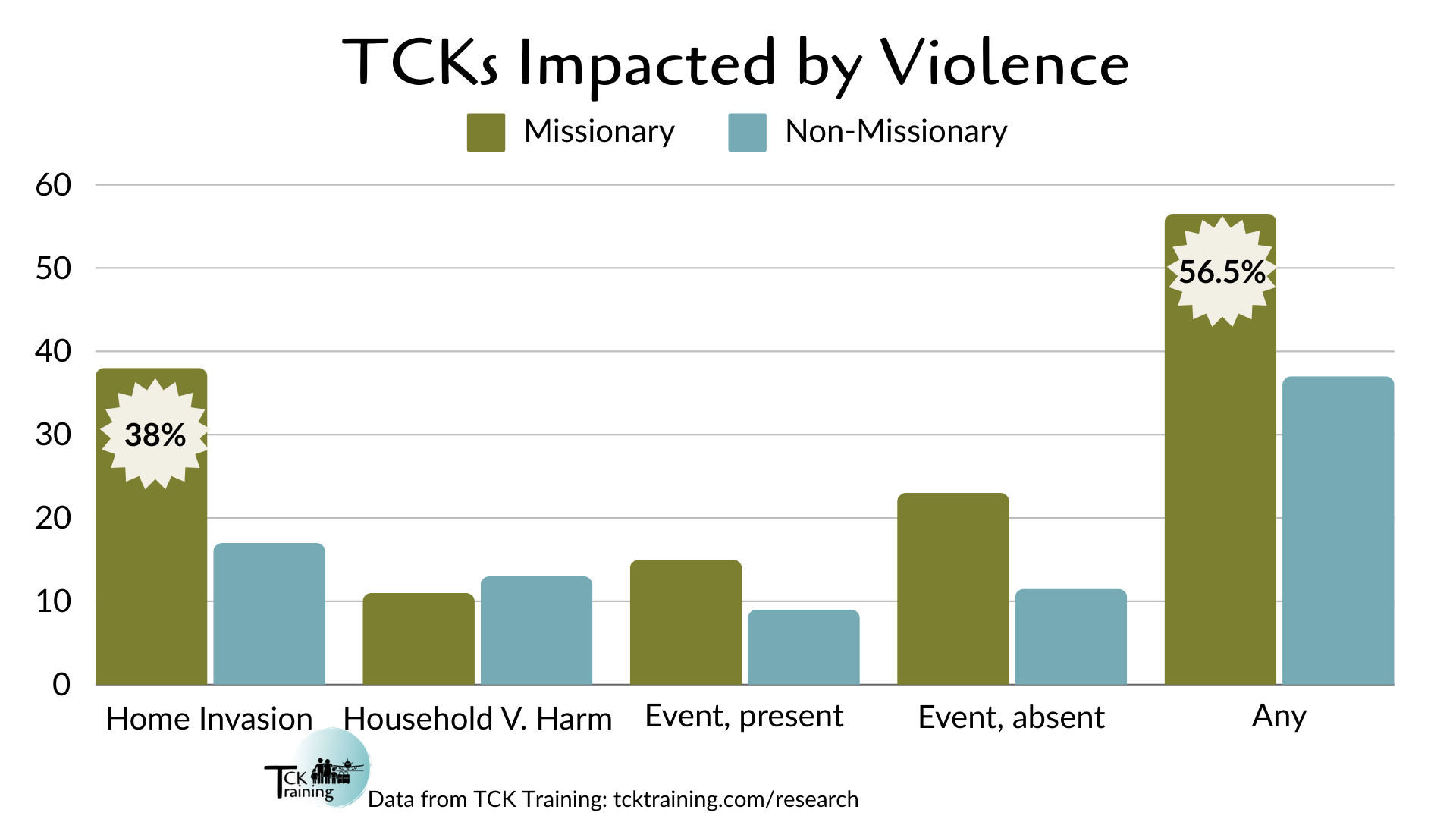
Overall Impact
While we labeled these ‘small-scale’ events, they are not small in impact. They were more likely to be associated with high-risk ACE scores than the larger scale events we will look at next. This emphasizes that trauma occurring at any scale can have a significant impact on well-being.
In addition to the small-scale events already mentioned, almost 2 in 5 MKs (38%) reported additional experiences of intense grief or fear. Those MKs had an elevated ACE risk (28%).
MKs reported experiences of small-scale traumatic events (medical, violent, and other intense grief/fear) at a higher rate than other TCKs. 70% of non-missionary TCKs experienced at least one of these, compared to 86% of MKs.
On the other hand, when MKs reported none of these potentially traumatic experiences, only 4% had a high-risk ACE score (as defined by a score of 4+ out of 10). This is not only less than one quarter of the risk rate seen in MKs overall, but is far lower than the risk rate seen in any global population we found in studies that asked the same question (8%-13%).
While we labeled these ‘small-scale’ events, they are not small in impact. They were more likely to be associated with high-risk ACE scores than the larger scale events we will look at next. This emphasizes that trauma occurring at any scale can have a significant impact on well-being.
In addition to the small-scale events already mentioned, almost 2 in 5 MKs (38%) reported additional experiences of intense grief or fear. Those MKs had an elevated ACE risk (28%).
MKs reported experiences of small-scale traumatic events (medical, violent, and other intense grief/fear) at a higher rate than other TCKs. 70% of non-missionary TCKs experienced at least one of these, compared to 86% of MKs.
On the other hand, when MKs reported none of these potentially traumatic experiences, only 4% had a high-risk ACE score (as defined by a score of 4+ out of 10). This is not only less than one quarter of the risk rate seen in MKs overall, but is far lower than the risk rate seen in any global population we found in studies that asked the same question (8%-13%).
Feeling safe and protected at home, and especially feeling that there is an adult in the home providing this protection, is one of the Positive Childhood Experiences (PCEs) that provide a buffer for children who experience difficult things. PCEs enable children to thrive as adults even if they meet with adversity in childhood.
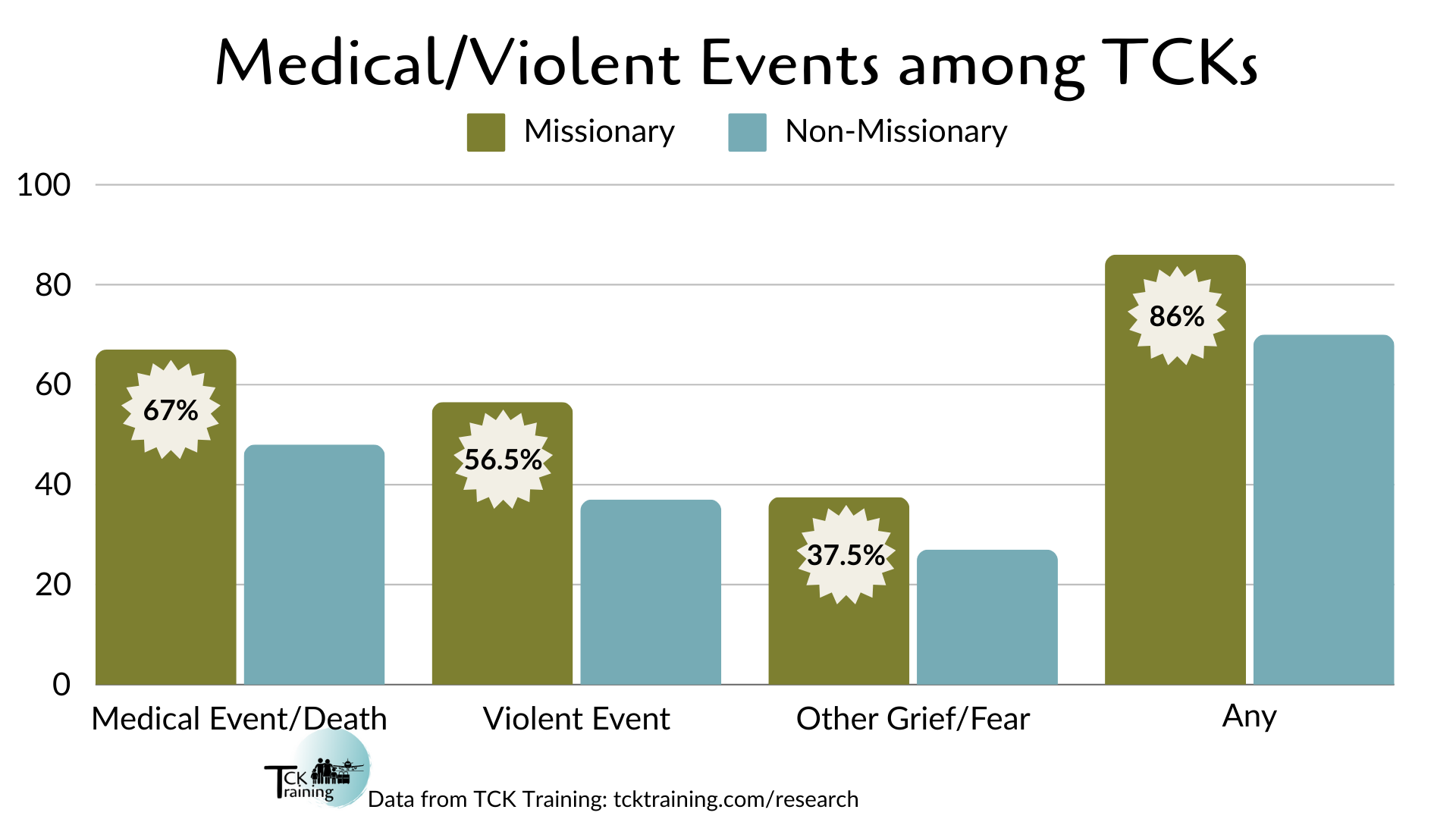
Large Scale Events
Political Disruption
Over half of MKs experienced a type of political disruption during their time abroad. While political violence/corruption may be considered minor by many TCKs thus hardly worth mentioning due to their high frequency (and therefore normalization), this environment contributes to a child’s perception of safety and who can be trusted in the world around them. 55% of MKs experienced political disruption, compared to 35% of other TCKs. Overall, there was only a small increase in high-risk ACE scores in this group (22%).
Over half of MKs experienced a type of political disruption during their time abroad. While political violence/corruption may be considered minor by many TCKs thus hardly worth mentioning due to their high frequency (and therefore normalization), this environment contributes to a child’s perception of safety and who can be trusted in the world around them. 55% of MKs experienced political disruption, compared to 35% of other TCKs. Overall, there was only a small increase in high-risk ACE scores in this group (22%).
Events that happen often can easily be normalized, which means it is important to know what is affecting international families in negative ways so we can call them out as stressors that need to be acknowledged and processed.
War/Unrest
One third of MKs (33%) reported being exposed to war and/or unrest, a similar rate to that seen among other TCKs (31%). One quarter of those MKs had a high-risk ACE score (23%). Exposure to war was associated with a small but consistent increase in all types of child maltreatment (more than seen in those who experienced political disruption), as well as in mental illness and substance abuse in household adults.
Natural Disasters
Nearly a third of MKs (28%) experienced a natural disaster, such as an earthquake or tsunami. Child maltreatment rates were higher again for this group than for the preceding large-scale events, particularly when it came to emotional abuse and neglect. One quarter of MKs (23%) that reported experiencing a natural disaster had a high-risk ACE score; 20% were physically neglected.
Evacuation
Evacuation can occur due to any large-scale event, or even small-scale events such as medical emergencies/illness. Almost one in five MKs (19%) experienced an evacuation, nearly double the rate seen among other TCKs (10%). Evacuation that leads to ‘forced’ repatriation is associated with a higher likelihood of TCKs having difficulties in adjustment. 1 in 5 MKs (20%) who experienced an evacuation had a high-risk ACE score.
One third of MKs (33%) reported being exposed to war and/or unrest, a similar rate to that seen among other TCKs (31%). One quarter of those MKs had a high-risk ACE score (23%). Exposure to war was associated with a small but consistent increase in all types of child maltreatment (more than seen in those who experienced political disruption), as well as in mental illness and substance abuse in household adults.
Natural Disasters
Nearly a third of MKs (28%) experienced a natural disaster, such as an earthquake or tsunami. Child maltreatment rates were higher again for this group than for the preceding large-scale events, particularly when it came to emotional abuse and neglect. One quarter of MKs (23%) that reported experiencing a natural disaster had a high-risk ACE score; 20% were physically neglected.
Evacuation
Evacuation can occur due to any large-scale event, or even small-scale events such as medical emergencies/illness. Almost one in five MKs (19%) experienced an evacuation, nearly double the rate seen among other TCKs (10%). Evacuation that leads to ‘forced’ repatriation is associated with a higher likelihood of TCKs having difficulties in adjustment. 1 in 5 MKs (20%) who experienced an evacuation had a high-risk ACE score.
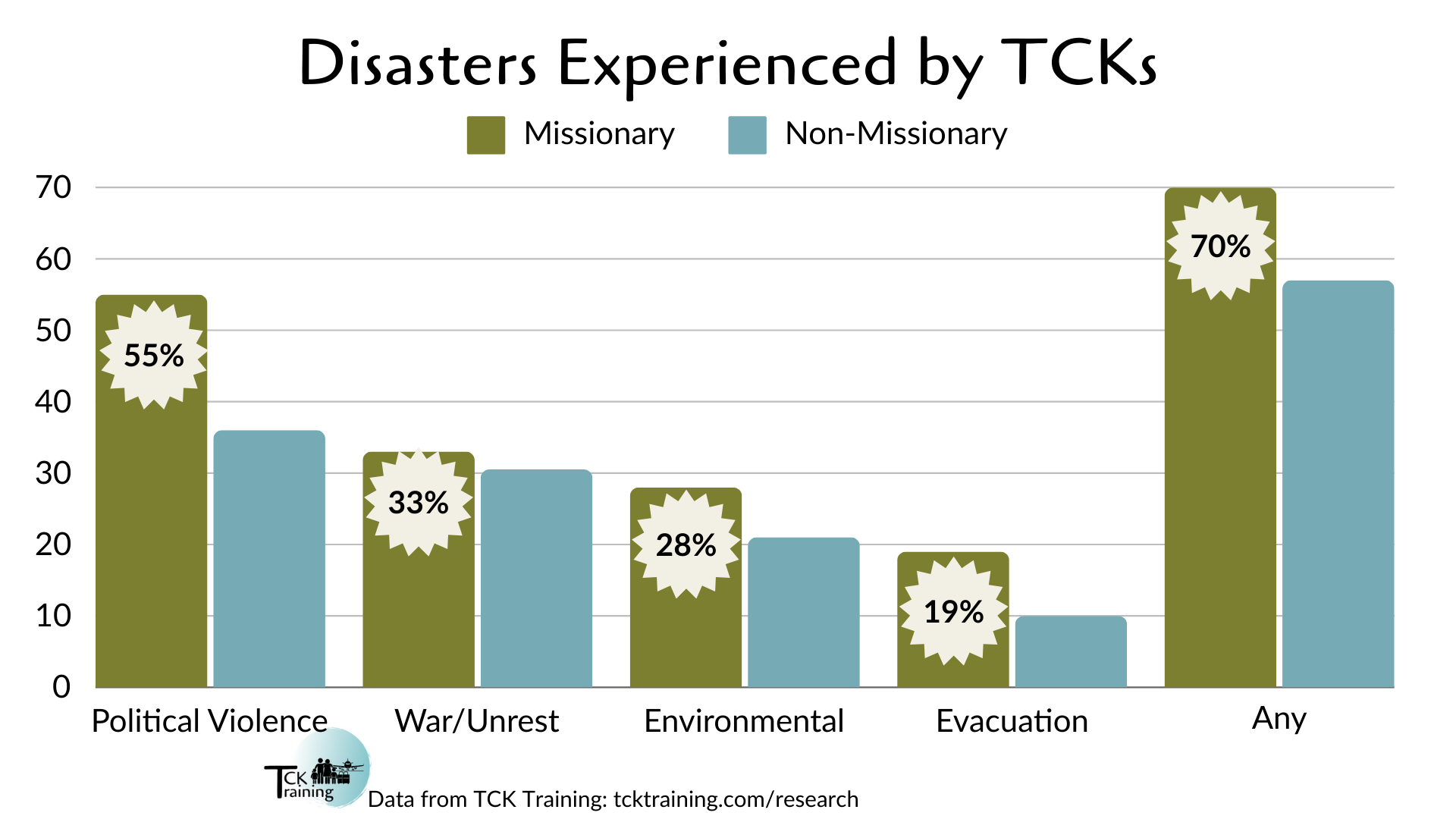
Overall Impact
70% of MKs had experienced a large-scale traumatic event. As seen in the chart above, MKs were more likely than other TCKs to report experiencing every type of large-scale traumatic event. When MKs did not experience any of these large-scale events, they were less likely to have high risk ACE scores.
70% of MKs had experienced a large-scale traumatic event. As seen in the chart above, MKs were more likely than other TCKs to report experiencing every type of large-scale traumatic event. When MKs did not experience any of these large-scale events, they were less likely to have high risk ACE scores.
Witnessed Events
Extreme Poverty
MKs were more likely than TCKs from any other sector to be exposed to extreme poverty. 77% of MKs reported they had witnessed extreme poverty at least once, and 61% said they witnessed this regularly.
MKs were more likely than TCKs from any other sector to be exposed to extreme poverty. 77% of MKs reported they had witnessed extreme poverty at least once, and 61% said they witnessed this regularly.
Living among those experiencing extreme poverty and knowing you cannot fix it can lead to what Rachel Pieh Jones labelled ‘moral injury.’
Serious Traffic Accidents
On the surface, traffic accidents may not seem like a big deal. Witnessing any serious traffic accident, however, is likely to cause an adrenal reaction, and at TCK Training we have heard many stories from Adult TCKs who as children witnessed major injuries and even deaths due to traffic accidents. 4 out of every 10 MKs (40%) had witnessed at least one serious traffic accident, while 1 in 10 witnessed them regularly.
On the surface, traffic accidents may not seem like a big deal. Witnessing any serious traffic accident, however, is likely to cause an adrenal reaction, and at TCK Training we have heard many stories from Adult TCKs who as children witnessed major injuries and even deaths due to traffic accidents. 4 out of every 10 MKs (40%) had witnessed at least one serious traffic accident, while 1 in 10 witnessed them regularly.
We’ve seen the impact of ongoing struggles related to witnessed accidents, even when TCKs were not directly involved in the accident themselves. A variety of reactions, including fear, anxiety, nightmares, reluctance to drive/learn to drive, and PTSD, can be involved.
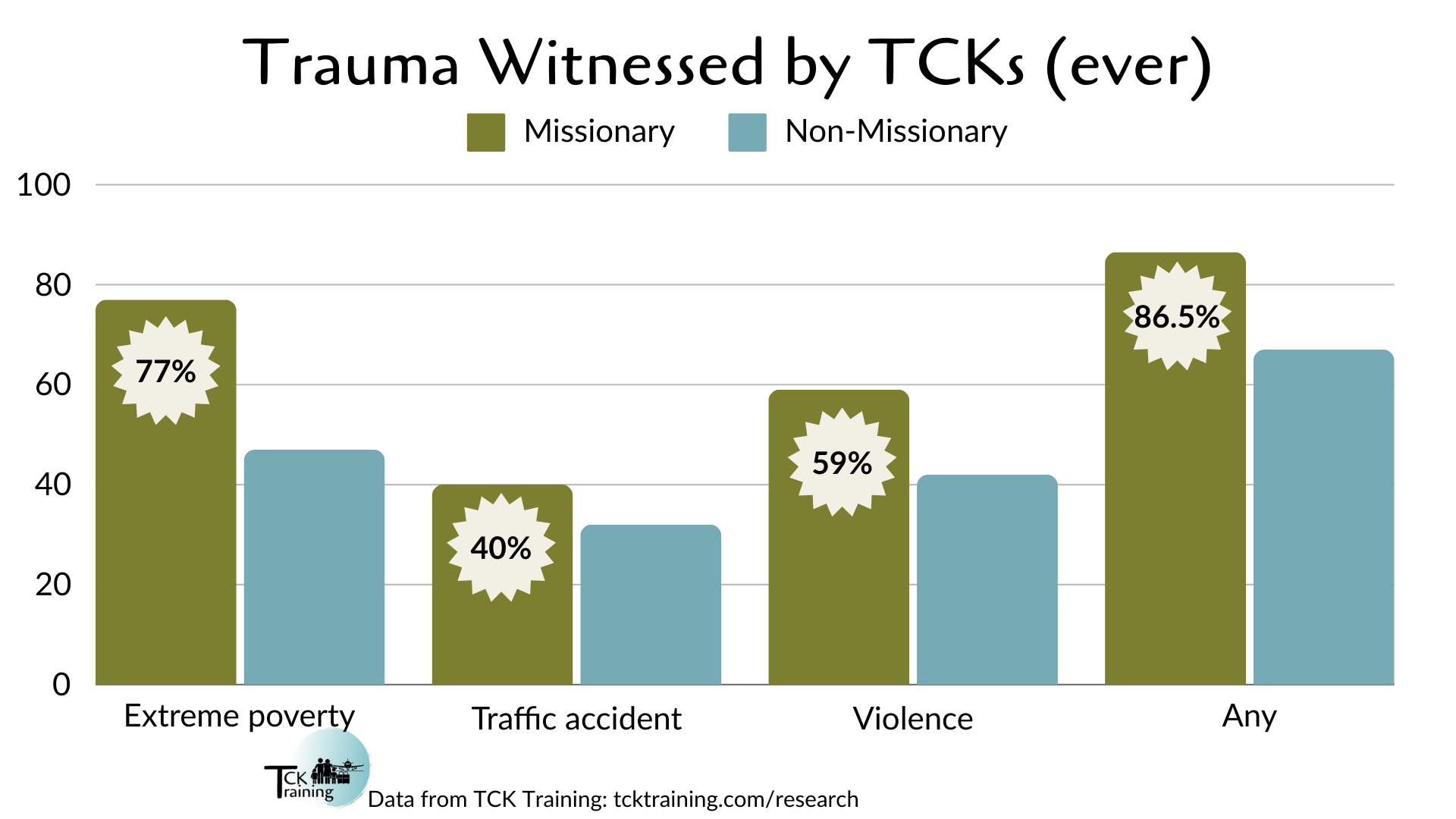
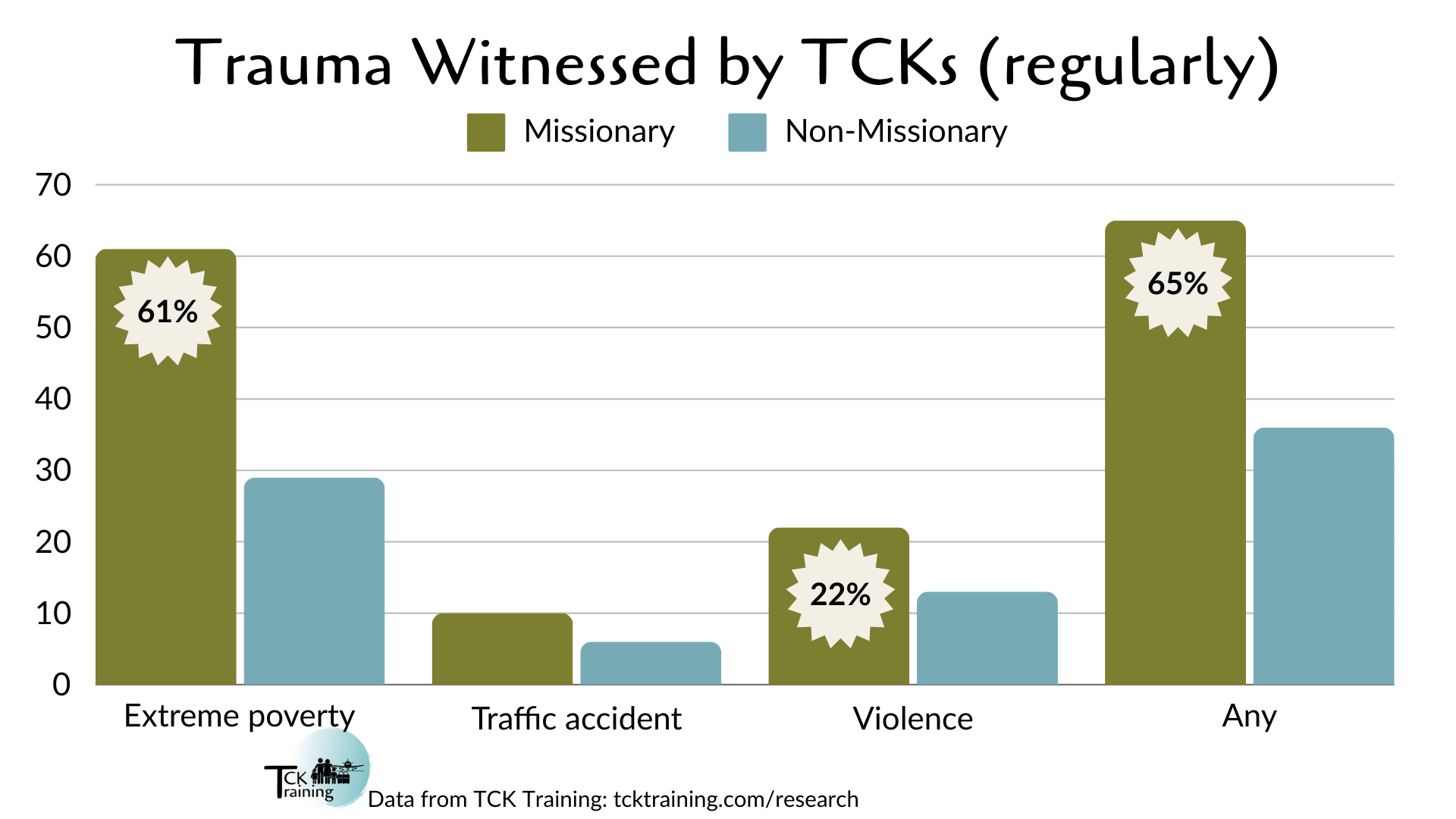
Violence
Witnessed violence combines experiences of armed conflict, human death, animal death, and physical violence. Nearly 3 out of every 5 MKs (59%) had witnessed a violent event, while 1 in 5 (22%) witnessed these events regularly. Exposure to violent events was connected with an increase in high-risk ACE scores, with the likelihood increasing with more frequent exposure.
1 in 5 MKs (20%) had witnessed armed conflict.
More than 1 in 5 MKs (22%) reported witnessing a traumatic human death at least once, including 4% who witnessed a murder. MKs who witnessed at least one traumatic human death had a 65% risk increase in ACE scores. Regularly witnessing traumatic human death, the case for 3% of MKs, increased the risk by 90%.
We also asked about traumatic animal death, as we have worked with many TCKs and ATCKs who had witnessed this and needed to process it later down the line. More than one third of MKs (35%) had witnessed the traumatic death of an animal, with more than 1 in 10 MKs (11%) witnessing this regularly. For missionary kids, regularly witnessing traumatic animal death was associated with a doubled risk of 4+ ACEs (from 17% to 33%).
Physical violence was the most commonly witnessed event: 35% of MKs witnessed at least one incident, and 13% saw these events regularly.
Child maltreatment was the norm among TCKs who regularly witnessed any kind of violence during childhood, including increased rates of physical abuse, physical neglect, sexual abuse, emotional abuse, and emotional neglect. For example, rates of emotional abuse were very high among MKs who witnessed violence: 53% (62% of those who regularly witnessed violence) were emotionally abused in the home.
Witnessed violence combines experiences of armed conflict, human death, animal death, and physical violence. Nearly 3 out of every 5 MKs (59%) had witnessed a violent event, while 1 in 5 (22%) witnessed these events regularly. Exposure to violent events was connected with an increase in high-risk ACE scores, with the likelihood increasing with more frequent exposure.
1 in 5 MKs (20%) had witnessed armed conflict.
More than 1 in 5 MKs (22%) reported witnessing a traumatic human death at least once, including 4% who witnessed a murder. MKs who witnessed at least one traumatic human death had a 65% risk increase in ACE scores. Regularly witnessing traumatic human death, the case for 3% of MKs, increased the risk by 90%.
We also asked about traumatic animal death, as we have worked with many TCKs and ATCKs who had witnessed this and needed to process it later down the line. More than one third of MKs (35%) had witnessed the traumatic death of an animal, with more than 1 in 10 MKs (11%) witnessing this regularly. For missionary kids, regularly witnessing traumatic animal death was associated with a doubled risk of 4+ ACEs (from 17% to 33%).
Physical violence was the most commonly witnessed event: 35% of MKs witnessed at least one incident, and 13% saw these events regularly.
Child maltreatment was the norm among TCKs who regularly witnessed any kind of violence during childhood, including increased rates of physical abuse, physical neglect, sexual abuse, emotional abuse, and emotional neglect. For example, rates of emotional abuse were very high among MKs who witnessed violence: 53% (62% of those who regularly witnessed violence) were emotionally abused in the home.
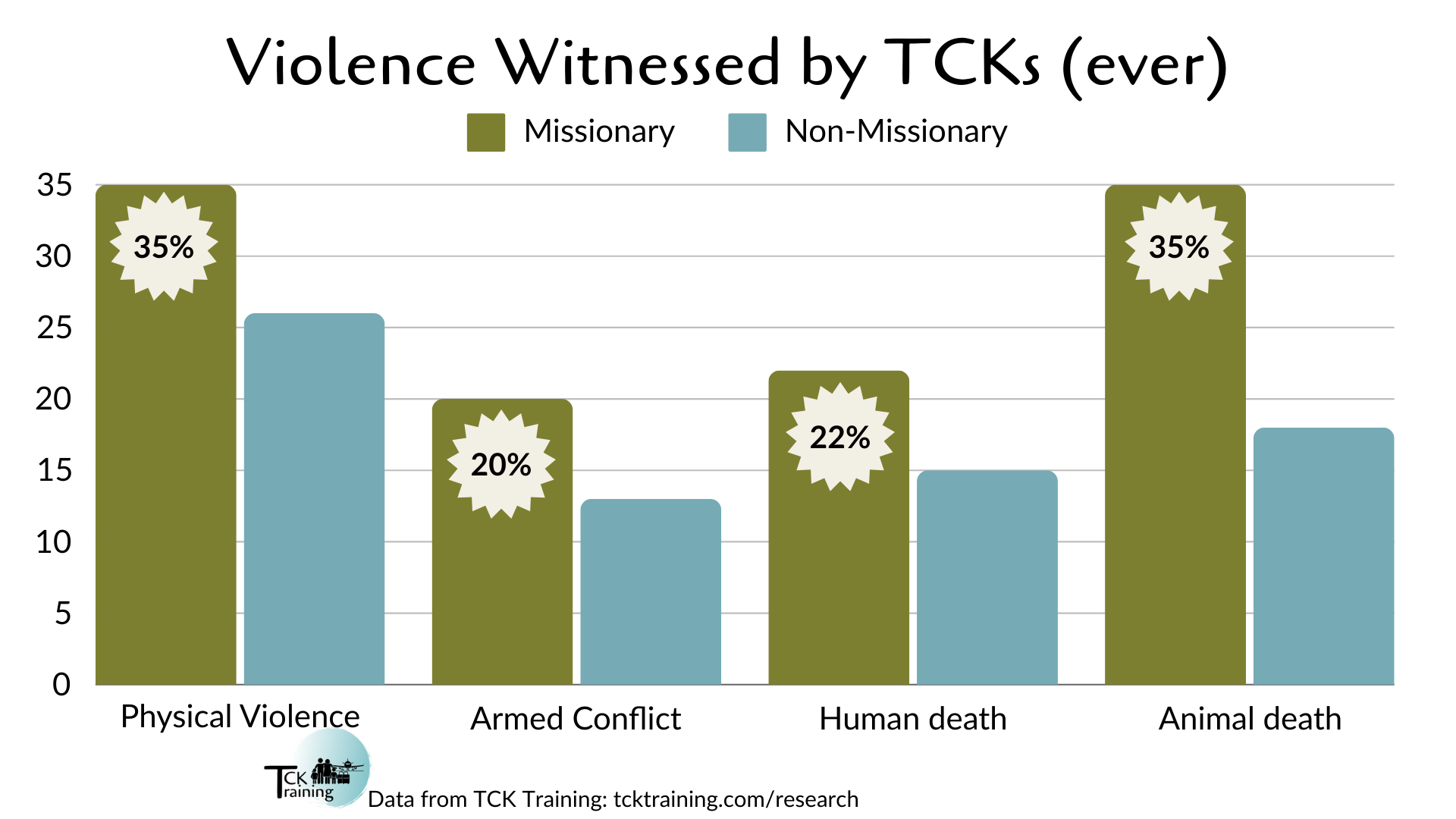
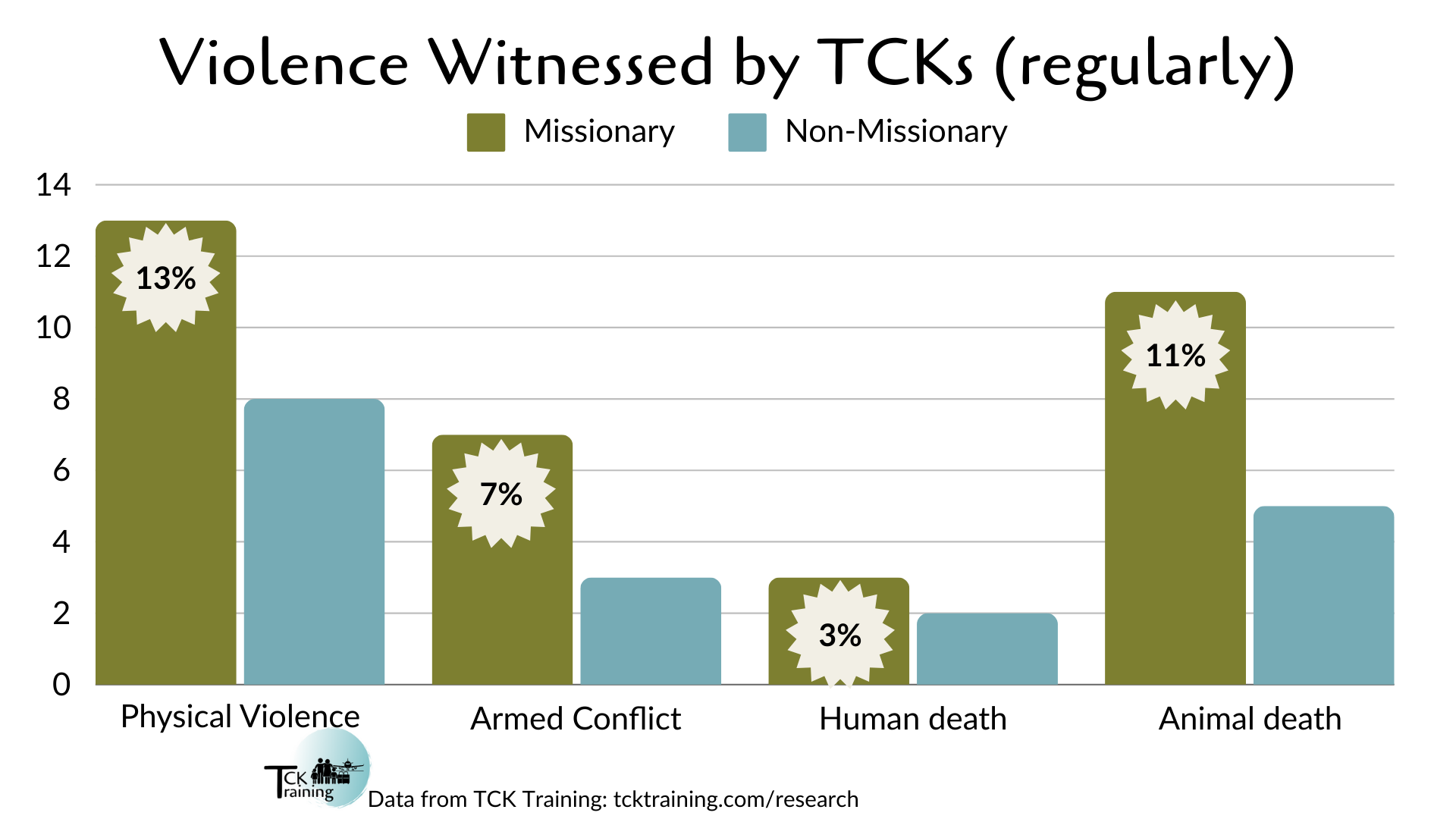
Overall Impact
86% of MKs witnessed at least one of these traumatic events, while two thirds of MKs (65%) witnessed potentially traumatic events regularly. Witnessing extreme poverty was the only potentially traumatic event not linked to higher-than-average risk. That is, MKs who witnessed extreme poverty but witnessed no other potentially traumatic event (18% of the group) had an ACE risk similar to that seen in the general MK population.
MKs that did not witness any of these types of traumatic events had much lower ACE scores not only than TCKs overall, but than any global population we found in studies that asked the same question: only 6%, compared to 8%-13% of the population in various global studies.
That said, ACE scores are not the only way to measure the impact of potentially traumatic events, and we anticipate that future research will help us learn more.
86% of MKs witnessed at least one of these traumatic events, while two thirds of MKs (65%) witnessed potentially traumatic events regularly. Witnessing extreme poverty was the only potentially traumatic event not linked to higher-than-average risk. That is, MKs who witnessed extreme poverty but witnessed no other potentially traumatic event (18% of the group) had an ACE risk similar to that seen in the general MK population.
MKs that did not witness any of these types of traumatic events had much lower ACE scores not only than TCKs overall, but than any global population we found in studies that asked the same question: only 6%, compared to 8%-13% of the population in various global studies.
That said, ACE scores are not the only way to measure the impact of potentially traumatic events, and we anticipate that future research will help us learn more.
Where do we go from here?
This data can feel overwhelming. These numbers are sobering, and it is right and good to take time to reflect on them – and the people these numbers represent. So many children, teens, and families we know have been through these traumas. Some of them have received excellent support and are doing well. Some of them have not, and are not. We can and should grieve the occasions in which trauma was not well addressed.
As we hold the weight of this, we ask the question: where do we go from here?
Potentially traumatic events threaten the mental health and stability of international families. When we recognize them as such, we can mobilize to acknowledge and debrief these events. These events cannot always be predicted; when changes in the environment threaten emotional/physical safety, especially through frequency of potentially traumatic events, the location’s suitability should be reassessed.
As we hold the weight of this, we ask the question: where do we go from here?
Potentially traumatic events threaten the mental health and stability of international families. When we recognize them as such, we can mobilize to acknowledge and debrief these events. These events cannot always be predicted; when changes in the environment threaten emotional/physical safety, especially through frequency of potentially traumatic events, the location’s suitability should be reassessed.
Flexibility and a willingness to change plans is important – in life generally, but especially in high risk areas. Sometimes a location changes from low risk to high risk very suddenly. Sometimes a single event changes how individuals within a family feel about their emotional and/or physical safety.
There are resources available to help those who were not helped effectively in the moment. Unstacking Sessions are a great resource to help Adult TCKs work through what happened in their childhoods and how this impacted their internal narratives. Some missionary organizations subsidize this service for young adults who grew up in families they sent abroad. Unstacking Your Grief Tower is a short and inexpensive book that helps Adult TCKs work through this process on their own.
More than this, however, we want to see good preventive care happen.
Debriefing is an incredibly powerful tool to help families work through the difficult parts of their journey in a way that also affirms the good things, while equipping parents to have ongoing conversations with their kids. We recommend that this happen annually, to catch things that aren’t noticed in the moment, with a full debrief every four years. A crisis debrief is a helpful tool when a particularly disruptive or traumatic event occurs. TCK Training also trains organizations and individuals to provide debriefing services (check out the available-any-time Asynchronous Debriefing Certification Training). A great book for parents who want to incorporate emotional support into their TCK parenting is Raising Up A Generation of Healthy TCKs, or for a shorter and more debrief-centric reading, The Grief Tower.
Churches can also be an integral support to help missionary kids and families. This free booklet on Biblical Foundations for MK Care is a great place to start, as is this training on Churches Supporting Missionary Kids. Churches are particularly crucial as a safe landing place for families who leave the field, especially if the move was precipitated (even in part) by exposure to trauma.
More than this, however, we want to see good preventive care happen.
Debriefing is an incredibly powerful tool to help families work through the difficult parts of their journey in a way that also affirms the good things, while equipping parents to have ongoing conversations with their kids. We recommend that this happen annually, to catch things that aren’t noticed in the moment, with a full debrief every four years. A crisis debrief is a helpful tool when a particularly disruptive or traumatic event occurs. TCK Training also trains organizations and individuals to provide debriefing services (check out the available-any-time Asynchronous Debriefing Certification Training). A great book for parents who want to incorporate emotional support into their TCK parenting is Raising Up A Generation of Healthy TCKs, or for a shorter and more debrief-centric reading, The Grief Tower.
Churches can also be an integral support to help missionary kids and families. This free booklet on Biblical Foundations for MK Care is a great place to start, as is this training on Churches Supporting Missionary Kids. Churches are particularly crucial as a safe landing place for families who leave the field, especially if the move was precipitated (even in part) by exposure to trauma.
The impact of witnessed trauma doesn’t end when we leave the environment in which it occurred. Unfortunately, upon leaving the field many missionary families lose the supportive community who understood those experiences. Taking care to support missionary families through the lens of accumulated trauma can make a big difference.
Other good resources you might appreciate include:
References:
- Caution and Hope: The Prevalence of Adverse Childhood Experiences in Globally Mobile Third Culture Kids (Crossman and Wells, 2022. TCK Training.)
- TCKs at Risk: Risk Factors and Risk Mitigation for Globally Mobile Families (Crossman, Wells and Vahey Smith, 2022. TCK Training.)
- Sources of Trauma in International Childhoods: Providing Individualized Support to Increase Positive Outcomes for Higher Risk Families (Crossman, Vahey Smith, Wells and McCall, 2023. TCK Training.)
- Home Invasion: Giving Missionary Kids Their Safe Place Back (Blog post, A Life Overseas. Crossman, 2024)
- What Missionary Kids See on the Field Part 1: The Impact of Witnessed Trauma (Blog post, A Life Overseas. Crossman, 2024)
- What Missionary Kids See on the Field Part 2: Support that Lessens the Impact of Witnessed Trauma (Blog post, A Life Overseas. Crossman, 2024)
Empty space, drag to resize
Tanya Crossman
Tanya grew up in Australia and the US before moving to China at age 21; she has worked with TCKs for 20 years. She is the Director of Research and International Education at TCK Training.



